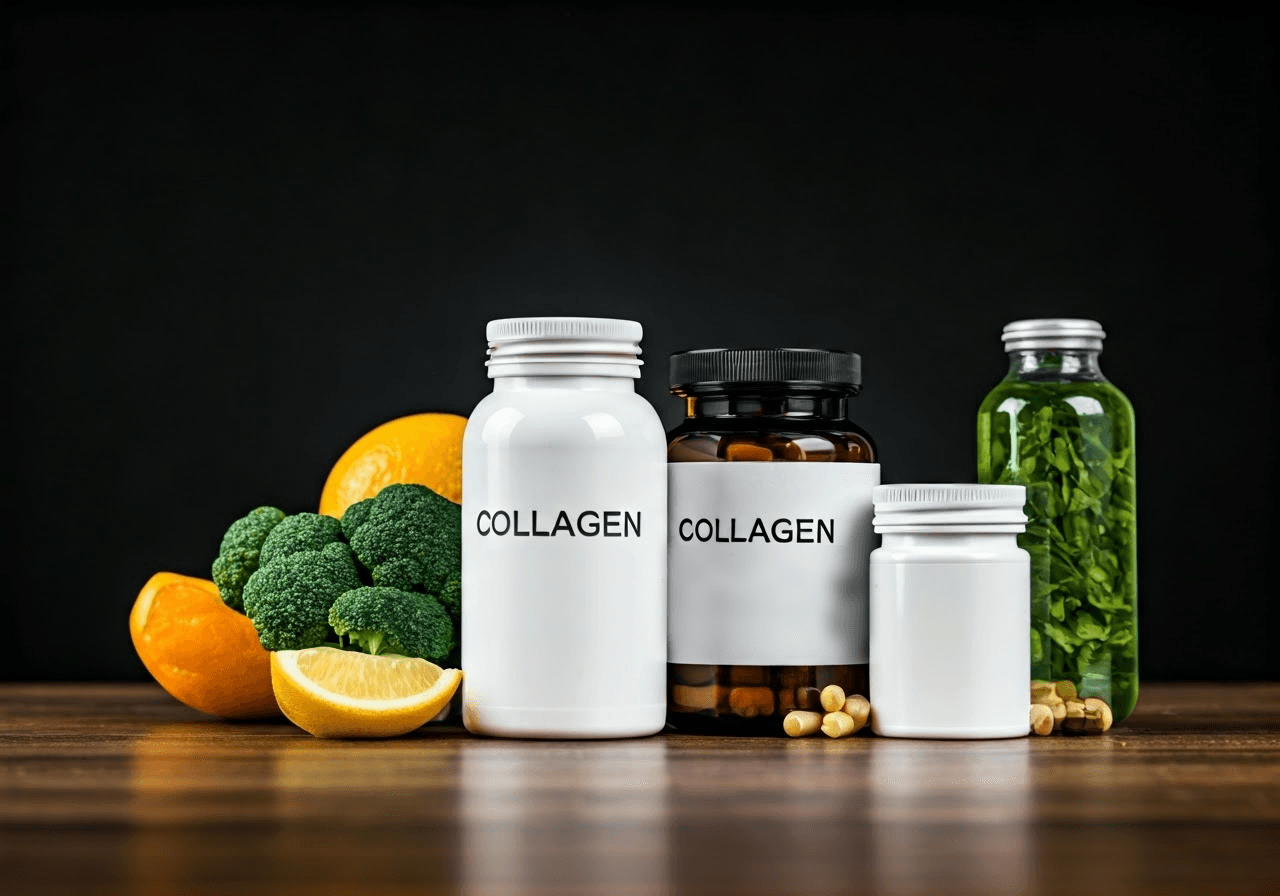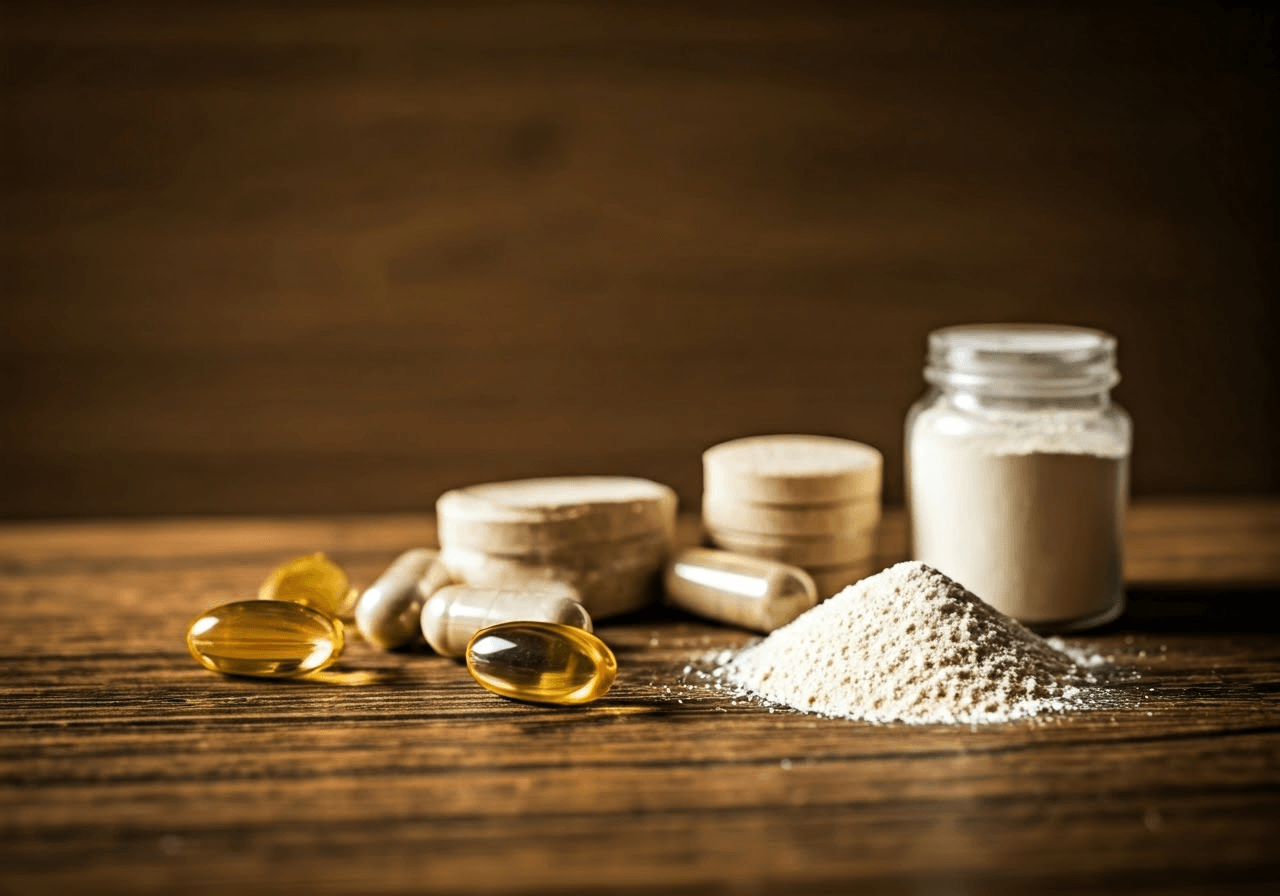
Introduction
Keeping good health often means more than just eating different types of foods. Dietary supplements can help provide extra support for your body and fill important nutritional gaps. However, they should be used to enhance a healthy diet, not take its place. As more people show interest in integrative health care, it’s important to understand both the benefits and risks of these supplements in drug administration. Whether you need to fix a vitamin deficiency or improve certain health areas, these products can be helpful in today’s health care, as long as they are chosen carefully and used correctly.
What Are Functional Supplements and Why Are They Important?
Functional supplements are special dietary supplements made to meet specific nutritional needs, including dietary supplement ingredients. They focus on health benefits, unlike regular multivitamins. These supplements aim at helping with areas like immune function, cognitive health, and digestive wellness. They provide support for the body’s complex systems.
These supplements can help fill in the gaps that a varied diet might leave behind. For example, fish oil can help support heart health, while probiotics can aid digestion. They work well for different groups of people, such as older adults, active individuals, or those with specific nutritional gaps.
However, it’s important to note that while functional supplements can be helpful, they do not replace healthy foods. The natural balance of nutrients found in whole foods is often better than those found in supplements alone. Using supplements wisely and with expert advice can make sure you get the best results safely.
Gut Health Essentials: Probiotics, Prebiotics & Digestive Enzymes

Keeping a healthy gut microbiome is important for overall health. Supplements like probiotics, prebiotics, and digestive enzymes are key to this. They help with digestion, balance gut bacteria, and improve how we absorb nutrients. All of this makes them very helpful for our body’s internal systems.
A healthy gut strengthens the immune system and helps digest food better. This helps your body work its best. These supplements work well with a varied diet and help with problems like bloating or not getting enough nutrients.
Probiotics – Gut Health, Immunity Support
Probiotics are tiny living things that help with digestion and strengthen immune function. You can find these helpful bacteria in foods like yogurt and fermented vegetables. They are also available in dietary supplements. Probiotics are very important for keeping your gut balanced, which is good for overall health.
Probiotic supplements can help with problems like constipation, diarrhea, and irritable bowel syndrome (IBS). They not only help digestion but also support immunity by making the gut stronger and helping it fight off germs. Taking probiotics regularly can lead to fewer and less severe common infections.
However, not all probiotic supplements are the same. Some strains like Lactobacillus and Bifidobacterium work better for certain problems. It’s important to pick the right one for your health needs, so consulting a healthcare professional is a good idea.
Prebiotics – Digestive Health, Microbiome Balance
Prebiotics are types of dietary fibers that help good bacteria in the gut. They are a kind of dietary supplement that can improve digestion and balance in the gut microbiome. Unlike probiotics, which add new bacteria, prebiotics feed the bacteria you already have. This helps them grow and work better.
These supplements can be found in foods like onions, garlic, and bananas. They help keep the gut balanced, support better digestion, and keep things regular. They also help lower inflammation in the body.
Having a balanced microbiome with prebiotics helps more than just digestion. It also supports immune function and mood health. When taken with probiotics, they work well together and boost gut health even more. Since everyone reacts differently to prebiotics, it’s important to follow the advice of health professionals about how much to take for the best results.
Digestive Enzymes – Nutrient Absorption, Bloating Relief
Digestive enzymes are important proteins that help break down food into nutrients our bodies can absorb. Using supplements with these enzymes can help the stomach and intestines work better, helping people who have trouble absorbing nutrients or who are sensitive to certain foods.
These supplements focus on specific parts of food. For instance, lactase helps with dairy products, and lipase assists in breaking down fats. If you have bloating, protease and amylase can help ease the discomfort caused by proteins and carbohydrates that haven’t been fully digested. Many people take enzyme supplements with meals to support better gut function.
These enzyme supplements are helpful for people with issues like pancreatitis or lactose intolerance, allowing them to digest and absorb nutrients better. Enzymes found in fruits like pineapple and papaya can also help our digestive health. Because everyone’s enzyme activity is different, it’s best to choose specific formulations with the help of a professional.
Table: Comparison of Gut Health Supplements
| Supplement Type | Primary Benefits | Common Sources | Best For |
|---|---|---|---|
| Probiotics | Gut balance, immunity support | Yogurt, kefir, supplements | Digestive issues, immune health |
| Prebiotics | Feeds good bacteria, microbiome | Garlic, onions, bananas | Long-term gut health, fiber intake |
| Digestive Enzymes | Breaks down food, reduces bloating | Papaya, pineapple, supplements | Bloating, nutrient absorption issues |
Essential Fatty Acids: Omega-3 & Fish Oil

Essential fatty acids, like Omega-3 and fish oil, are very important for a healthy heart, reducing inflammation, and helping your brain work well. These dietary supplements come from fatty fish, plant oils, and whole grains. They offer benefits that many people’s diets do not provide.
Omega-3 and fish oil support joint health, help prevent heart disease, and improve clear thinking. Taking these supplements regularly makes sure that your body gets the fatty acids it needs. This supports your overall health goals and helps fix common nutritional gaps in today’s diets.
Omega-3 Fatty Acids (EPA & DHA) – Heart Health, Brain Function
Omega-3 fatty acids, especially EPA and DHA, are important for keeping your heart healthy and supporting your brain. These fatty acids help lower inflammation. They may also reduce the risk of heart disease by improving blood fats and helping to control blood pressure. Their impact on brain health is significant as they protect nerve cells and improve connections between them. Eating a varied diet that includes fatty fish, flaxseeds, and walnuts can help you get enough of these good nutrients. They are vital for your overall health and wellness.
Fish Oil – Cardiovascular Health, Inflammation Reduction
Fish oil supplements are rich in Omega-3 fatty acids. They help support heart health and reduce inflammation in the body. These supplements come from fatty fish and are great for anyone wanting to reduce inflammation or improve heart function.
Fish oil helps heart health by lowering blood pressure, improving cholesterol levels, and increasing blood flow. The EPA and DHA in fish oil can ease problems such as joint pain and other inflammatory issues. People with rheumatoid arthritis often find that taking fish oil regularly brings them relief.
Even though fish oil has many health benefits, taking too much can thin the blood or slow down clotting. It’s important to follow the dosing recommended by doctors, especially if you’re considering supplements that may interact with vitamin K. Choosing high-quality, purified, and sustainably sourced fish oil supplements can help ensure they are effective while reducing risks from contaminants.
Table: Omega-3 Fatty Acids (EPA/DHA) vs. Fish Oil: Key Differences
| Supplement | Key Components | Primary Benefits | Recommended For |
|---|---|---|---|
| Omega-3 (EPA/DHA) | EPA & DHA | Brain function, anti-inflammatory | Cognitive health, joint support |
| Fish Oil | EPA, DHA, vitamins | Heart health, cholesterol balance | Cardiovascular wellness |
Structural Support: Collagen, Glucosamine & Chondroitin

Structural health supplements like collagen, glucosamine, and chondroitin help people improve their joint movement, ease pain, and keep their connective tissue strong. These supplements can be useful for older adults, athletes, and anyone with joint problems.
They can help with skin tightness, support cartilage health, and make joints stronger. When you use these supplements along with exercise and a healthy diet, you could see greater benefits over time.
Collagen Supplements – Skin Elasticity, Joint Support
Collagen supplements are popular for better skin health and support for connective tissues like ligaments and cartilage. Our bodies naturally make collagen, but it decreases as we age. This loss leads to wrinkles, sagging skin, and joint pain.
Taking collagen can improve skin elasticity. It helps reduce signs of aging and increases hydration. It also helps joints by improving lubrication and flexibility. This is helpful for people with arthritis or joint pain. Collagen comes in hydrolyzed forms, which are easier for the body to absorb.
You can find collagen in bone broth and from skin-friendly foods like fish and eggs. For the best results, choose brands with clinically tested formulas. Combine them with exercise and a balanced diet. Health professionals can guide you in picking collagen supplements that fit your age and physical needs.
Glucosamine – Joint Mobility, Arthritis Relief
Joint mobility depends a lot on healthy cartilage. Glucosamine is important for keeping cartilage in good shape. This natural amino sugar can help joint function and reduce arthritis symptoms. Studies show that glucosamine may help repair cartilage and lower inflammation. This is very important for people with joint pain. Taking it as a dietary supplement can improve mobility and provide relief, especially for older adults or those involved in athletic performance. Adding glucosamine to your daily routine may lead to better joint health and a more active life.
Chondroitin – Cartilage Protection, Joint Pain Reduction
Chondroitin is very important for keeping our joints healthy. It protects cartilage and helps it stay strong against damage. This natural compound helps keep cartilage moist. This improves its ability to absorb shock and decreases friction in the joints. Studies show that chondroitin sulfate might help lessen osteoarthritis symptoms by reducing joint pain and improving movement. Adding this supplement to your routine, along with other helpful nutrients like glucosamine, can lead to better main joint function and comfort. Overall, it is a great addition to a healthy lifestyle.
Table: Joint & Skin Support
| Supplement | Primary Role | Key Benefits | Ideal Users |
|---|---|---|---|
| Collagen | Skin and joint structure support | Enhances skin elasticity, promotes joint flexibility | Aging adults, athletes |
| Glucosamine | Cartilage regeneration | Supports joint mobility, eases arthritis pain | Older adults, individuals with osteoarthritis |
| Chondroitin | Cartilage cushioning and protection | Reduces joint friction, relieves inflammation | Active individuals, arthritis patients |
Cellular Energy & Antioxidants

The importance of cellular energy and antioxidants in our health is very big. Coenzyme Q10 (CoQ10) is key for producing ATP, and it helps the heart by boosting energy in cells. Alpha-lipoic acid (ALA) is a strong antioxidant. It helps keep blood sugar levels steady and protects the body from damage. Resveratrol and quercetin also help by boosting antioxidant protection. They support heart health and lower inflammation. In addition, astaxanthin is special because it protects the skin from outside stress. This shows how important cellular energy and antioxidants are for good health.
Coenzyme Q10 (CoQ10) – Cellular Energy, Heart Health
Coenzyme Q10 (CoQ10) is a strong antioxidant. It is important for making energy in our cells. CoQ10 helps turn nutrients into adenosine triphosphate (ATP). This energy is needed for our body, especially in high-energy organs like the heart. Studies show that having enough CoQ10 can help heart health. It can help keep blood pressure in check and improve how the heart works. CoQ10 also helps with athletic performance and helps in recovery. This makes it a great part of a healthy lifestyle. Eating foods that have CoQ10 and taking dietary supplements can increase its levels in our body.
Alpha-Lipoic Acid (ALA) – Antioxidant, Blood Sugar Balance
Alpha-lipoic acid (ALA) is a strong antioxidant. It helps improve the body’s overall health by fighting free radicals and lowering oxidative stress. ALA is special because it works well in both water and fat. This makes it very effective. It can help control blood sugar, which is especially useful for people with insulin sensitivity. Adding ALA to a balanced diet may also help support nerve health. This is beneficial for older adults and those at risk for nerve damage. As a health supplement, ALA can help with managing diabetes and improving well-being.
Resveratrol – Anti-Aging, Cardiovascular Health
Rich in antioxidants, resveratrol has become popular for its health benefits. It may help with heart health. You can find resveratrol in food sources like red wine and berries. This compound can improve blood flow and reduce blood pressure. This can lower the risk of heart disease. Resveratrol also has anti-aging effects. It helps fight oxidative stress, which keeps cells healthier and reduces age-related health problems. Taking resveratrol in dietary supplements or through food can help you stay well and live longer.
Quercetin – Anti-Inflammatory, Immune Support
Quercetin is full of flavonoids. It is a strong anti-inflammatory agent. This means it helps support the immune system. Quercetin works by changing how the immune system responds. This can help the body fight inflammation and may lower the risk of long-term diseases. Research shows that quercetin, found in many fruits and vegetables, might also help lessen allergy symptoms. With its antioxidant features, quercetin helps keep cells healthy. It fights free radicals, which are bad for health. In turn, it builds a strong immune system. This encourages better health for everyone, no matter their age.
Astaxanthin – Skin Protection, Antioxidant Defense
Astaxanthin is well-known for its bright red color. It is a strong antioxidant found in dietary supplements. This carotenoid can greatly protect your skin. It helps reduce oxidative stress and improves skin hydration, making your skin more elastic. Its special structure allows it to get into cell membranes easily. This gives good protection against UV damage and helps maintain a youthful look. Research shows that astaxanthin might help lessen signs of aging and support the immune function of your body. Adding this amazing supplement to your routine could greatly improve your skin health and defense systems.
Table: Cellular Energy & Antioxidant Supplements
| Supplement | Primary Role | Key Benefits | Ideal For |
|---|---|---|---|
| Alpha-Lipoic Acid (ALA) | Antioxidant, blood sugar balance | Regulates blood sugar, combats oxidative stress | Diabetics, individuals with nerve health concerns |
| Astaxanthin | Skin protection, antioxidant defense | Protects against UV damage, improves skin elasticity | Skin health enthusiasts, anti-aging users |
| Coenzyme Q10 (CoQ10) | Cellular energy production, heart health | Boosts ATP production, supports cardiovascular function | Individuals seeking heart and energy support |
| Quercetin | Anti-inflammatory, immune booster | Strengthens immune response, reduces inflammation | Allergy sufferers, immune support seekers |
| Resveratrol | Anti-aging, cardiovascular health | Enhances blood flow, reduces oxidative damage | Aging adults, heart health focus |
Mood Health Essentials

Key parts that affect mood and our mental health are very important. Substances like 5-HTP help make serotonin. This may boost mood and help ease feelings of depression. Choline is important for the brain. It helps with memory and brain health. Phosphatidylserine might help reduce stress by keeping cortisol levels healthy. Adding these dietary supplements to a balanced routine can help create better emotional strength. Paying attention to different nutrients, along with advice from health professionals, can improve mood and quality of life even more.
5-HTP – Mood Enhancement, Serotonin Boost
5-HTP comes from the seeds of the African plant Griffonia simplicifolia. It is known for helping to improve mood. As a building block for serotonin, it is important for emotional health. It can help reduce signs of anxiety and depression. Health professionals say that taking this dietary supplement might help people who have stress or mood problems. Studies show that it may work well. It helps the body make more serotonin, which can lead to better mood control and better mental health overall.
Choline – Brain Health, Memory Support
Choline is an important nutrient that helps keep the brain healthy and improves thinking skills. It is essential for making acetylcholine, a chemical in the brain that is necessary for learning and memory. Getting enough choline is important for good brain health. You can find choline in food sources like lean meats, dairy products, and green vegetables. It helps keep cells strong and can help slow down problems with memory. Recent studies show that having enough choline may lower the chances of brain disorders. This makes choline a key part of a healthy diet, especially for pregnant women and older adults.
Phosphatidylserine – Cognitive Function, Stress Reduction
Phosphatidylserine is important for keeping our brain functions sharp and managing stress. This natural substance is found mainly in the brain. It helps nerve cells talk to each other and may improve memory and learning. Research shows that it can help reduce stress effects and clear the mind, especially in older adults. Taking phosphatidylserine as a supplement may help people with declining thinking skills or those who want to boost their mental performance. Adding phosphatidylserine to a healthy diet can support overall brain health and well-being.
Table: Mood Health Supplements
| Supplement | Primary Role | Key Benefits | Ideal For |
|---|---|---|---|
| 5-HTP | Serotonin production, mood booster | Improves mood, reduces anxiety and depression symptoms | Individuals with mood swings, anxiety sufferers |
| Choline | Brain function, memory support | Enhances cognitive performance, supports brain cell health | Students, older adults, pregnant women |
| Phosphatidylserine | Cognitive function, stress management | Reduces cortisol, improves memory and focus | People under stress, aging populations |
Sleep Support Essentials

Quality sleep is very important for your overall health. It affects your mood, how well you think, and your immune system. Melatonin is a natural hormone that helps control your sleep-wake cycle. It can be helpful for people who struggle with insomnia or have irregular sleep patterns. Adding dietary supplements that contain melatonin may improve both the quality and length of your sleep. Also, nutrients like magnesium and some herbal supplements can help you relax and sleep better. Focusing on sleep with these supportive supplements can lead to better health. It can help you manage stress and improve how you function every day.
Melatonin – Sleep Regulation, Insomnia Support
Melatonin is a hormone that our bodies produce naturally. It plays an important role in how we sleep. People who have trouble sleeping, like those with insomnia or irregular sleep patterns, may find melatonin supplements helpful. This is especially true during stressful times or when traveling to different time zones. Studies show that melatonin might improve the overall quality of sleep. Improved sleep can lead to better long-term health, such as a sharper mind and a better mood. If you are thinking about melatonin supplements, it’s a good idea to talk with a health care professional. They can help you decide the right dosage and timing to get the best effects while reducing possible side effects.
Superfoods & Nutrient-Dense Supplements

Nutrient-rich supplements are a great way to improve your overall health. They provide concentrated sources of vitamins and minerals. Spirulina is one example. It has a lot of antioxidants that help boost your immune function and increase energy levels. Chlorella is another supplement. It helps detoxify the body by removing heavy metals. Fiber supplements are important too. They support digestive health and help keep blood sugar steady. This makes them key for a balanced diet. Multivitamins also play a role. They act like nutritional insurance to make sure you get a wide range of dietary intake for good health. Including whole foods with these supplements can help you have a solid nutrition plan.
Spirulina – Antioxidant Power, Immune Boost
Spirulina is a blue-green algae known for its strong antioxidant qualities. It is rich in amino acids, vitamins, and minerals. Spirulina helps boost the immune system and helps the body’s ability to fight infections. Studies show it can also lower inflammation and oxidative stress. This makes spirulina a great addition to a diet aimed at overall health. You can add spirulina to smoothies or healthy snacks. This is especially helpful for athletes and those who want to improve their nutrition. As a dietary supplement, it helps keep you well, even with a busy lifestyle.
Chlorella – Detoxification, Heavy Metal Removal
Chlorella is a green algae full of nutrients and known for its strong detox support. This supplement helps the body’s ability to get rid of heavy metals. It binds to toxins and helps remove them from the body. Chlorella is high in chlorophyll. This means it also helps boost immune function and improves overall health. Taking chlorella regularly can help the body handle oxidative stress. This makes it a good choice for people who want to stay healthy in a polluted world. Adding chlorella to a varied diet can help you reach your goal of good health.
Fiber Supplements – Digestive Health, Blood Sugar Control
Fiber supplements are very important for good digestion and controlling blood sugar levels. Soluble fiber, like psyllium, can help with cholesterol levels. It also makes you feel full, which helps with managing weight. Adding these supplements to a balanced diet can keep glucose levels steady. This reduces spikes that could lead to health problems. Different types of fiber, from plants and synthetic sources, give essential benefits. They help the body break down nutrients better and support overall health.
Multivitamins – Nutritional Insurance, Overall Health
Multivitamins are important for good nutrition, especially for those who find it hard to eat a variety of foods. They give key vitamins and minerals that help support overall health. This can help fill gaps that might come from missing certain nutrients in the diet. For groups like pregnant women and older adults, multivitamins can boost nutrient intake. They help lower health risks and improve how the body works. By adding important nutrients like vitamin D, vitamin C, and folic acid to your daily routine, these supplements can also support immune function and improve heart health and energy levels.
Powerful Immunity Boosters

Support for the immune system can greatly improve with the right dietary supplements. Beta-glucans, found in yeast and grains, help to activate immune cells. This builds a strong defense against infections. Colostrum, which is the first milk made after birth, is full of antibodies. It supports gut health and boosts immune protection. Also, adding medicinal mushrooms like reishi and lion’s mane to your routine may strengthen your immunity. These can even help improve thinking skills. When you use these supplements along with a varied diet, they can really help maintain good health.
Beta-Glucans – Immune Activation, Infection Defense
Beta-glucans are special types of soluble fibers found in foods like oats and barley. They are known to help boost the immune system. These compounds work with immune cells to help them recognize and fight off germs. This support helps our bodies deal with infections. Studies have shown that beta-glucans can also improve how the body reacts to vaccines and may lessen the effects of allergies. Eating foods rich in beta-glucans as part of a varied diet can strengthen natural defenses and promote a healthier immune system. This makes them a great addition to any diet.
Colostrum – Gut Health, Immune Protection
Colostrum is rich in immunoglobulins and growth factors. This makes it a strong dietary supplement that can improve gut health and immune protection. It is the first type of milk made by mammals and has important nutrients that help the body’s immune function. This can help prevent infections and reduce inflammation. Colostrum is especially helpful for older adults and people with weak immune systems. It can also help balance gut flora, which is great for digestive health. By adding this natural supplement to your routine, you might protect yourself from various health problems and support your overall well-being.
Medicinal Mushrooms (Reishi, Lion’s Mane, Cordyceps) – Immunity, Cognitive Enhancement
Medicinal mushrooms, like reishi, lion’s mane, and cordyceps, provide many health benefits. Reishi is famous for helping the immune system. It can improve the body’s ability to fight infections. Lion’s mane helps with brain function. It may support nerve growth and reduce memory loss. Cordyceps is known to boost energy levels and athletic performance. This makes it popular with active people. Adding these mushrooms to your diet can improve overall health and wellness, making them a smart choice for your health.
Lesser-Known Supplements Worth Considering

Exploring lesser-known supplements can reveal strong partners for your health. N-acetyl cysteine (NAC) is valuable for detoxing. It helps with breathing and fights oxidative stress. D-ribose is important energy for cells. It is key for heart health, especially when you feel tired. Hydrolyzed keratin may boost hair strength and support skin health. This makes it a great choice for people facing hair loss or skin problems. Although these supplements often don’t get attention, they can really help your overall wellness when added to a balanced dietary intake.
N-Acetyl Cysteine (NAC) – Detoxification, Respiratory Health
N-acetyl cysteine (NAC) is a strong aid for detox and lung health. It is a building block for the powerful antioxidant glutathione. This helps reduce oxidative stress from things like toxins in the environment or poor eating habits. NAC is also helpful for breathing. It helps make mucus thinner, which makes it easier to breathe. This is especially good for people with ongoing lung problems. It also helps with amino acid production and may improve lung function. So, adding NAC to your daily supplements can be very useful.
D-Ribose – Cellular Energy, Heart Function
D-ribose is an important sugar that helps create energy in cells, especially in muscles and the heart. This sugar has five carbon atoms and is key for making ATP, which is the energy that cells use. It helps people recover from tough workouts and can improve athletic performance. For people with heart disease, taking D-ribose may help the heart work better by increasing energy levels. It can also help reduce tiredness in people with chronic fatigue syndrome. For anyone looking to be healthy, adding D-ribose could be a good choice.
Hydrolyzed Keratin – Hair Strength, Skin Health
Hydrolyzed keratin is a strong ingredient found in many beauty and dietary supplements. It helps make hair stronger and improves skin health. This nutrient comes from animal proteins and goes deep into hair fibers. It works to restore moisture, reduce breakage, and enhance texture. The benefits go beyond just hair. It helps the skin by improving elasticity and making fine lines less noticeable. Adding hydrolyzed keratin to your routine can help you look healthy and radiant. It also tackles common beauty issues linked to aging and damage from the environment.
Choosing High-Quality Supplements

Identifying good supplements means looking closely at the labels and knowing what certifications mean. Look for approval seals from trusted groups like the National Institutes of Health or the FDA. These seals show that the product is safe and meets quality standards. It is also important to think about how well the body can absorb the ingredients. Better absorption means vitamins and nutrients, like folic acid, vitamin D, and omega-3 fatty acids, work better. Stay away from products that have unclear ingredients or unproven health claims. Talking to health professionals can help you choose supplements that support your overall health without added risks.
What to Look for in Supplements: Certifications & Label Transparency
A key part of choosing good dietary supplements is knowing about certifications and clear labeling. Look for products approved by outside groups that check quality and safety. Labels should clearly show all ingredients, both active and inactive, along with their amounts. This helps you make smart choices about your dietary intake. When companies are open about where they get their ingredients and how they make their products, it shows they care about quality. This way, you can avoid health risks that come from misleading ads. By choosing trusted brands, you can improve your overall health and reduce the chance of side effects from supplements.
When navigating the supplement market, familiarizing yourself with certifications like GMP (Good Manufacturing Practices) and NSF (National Sanitation Foundation) is crucial. GMP ensures that products are consistently produced and controlled according to quality standards, which minimizes contamination risks and guarantees identity and strength. Similarly, the NSF certification verifies that a product has undergone rigorous testing for safety and efficacy, giving consumers peace of mind.Additionally, reputable brands often pursue certifications from third-party organizations, indicating transparency in their manufacturing processes. These seals not only affirm quality but also reassure consumers that they are investing in supplements that meet high standards.
Avoiding Low-Quality Supplements: Red Flags to Watch Out For
Cheaper supplements might mean lower quality. Always look for certifications from trusted organizations. These certifications show that the products meet good manufacturing standards. Also, be careful with ingredient lists that use unclear language; being clear is important for safety. Too many health claims might mean the product is overstated instead of backed by science. Additionally, be cautious with proprietary blends that do not provide exact dosages. This lack of information makes it hard to judge how well the product works. Talking to health professionals can help you find reliable brands. This way, you can make sure your food choices are good for your health. Always choose quality to protect your health journey.
Navigating the realm of nutrient supplements requires careful examination of labels for red flags that suggest inferior quality. Here are some common warning signs you should recognize: 1. Ambiguous Ingredient Lists: Steer clear of products that use terms such as “proprietary blends” or vague phrases like “natural flavors.” Such ambiguous labels can conceal the true composition of what you’re consuming. 2. Overblown Health Claims: Exercise caution with products that guarantee extraordinary results or seem implausibly beneficial.
Understanding Bioavailability: Why Supplement Forms Matter
Bioavailability is an important factor that affects how well our body takes in and uses nutrients from dietary supplements. The form of the supplement, like capsules, powders, or liquids, can change how quickly these nutrients are absorbed. For example, liquid supplements usually have better bioavailability than solid ones. This means they can be absorbed faster and work better. Knowing about these differences helps people choose supplements that fit their health goals. Talking to health professionals can also help individuals make smart choices about the types and amounts of supplements they use, which supports overall health.
Liposomal and chelated forms of supplements are becoming popular due to their enhanced absorption rates. Liposomal supplements encapsulate nutrients in lipid bubbles, which protect them from degradation in the digestive tract, allowing for more effective delivery into cells. This method is especially beneficial for fat-soluble vitamins like A, D, E, and K. Chelated supplements, on the other hand, bind minerals to organic molecules, which improves their stability and absorption. This process helps ensure that essential minerals such as magnesium and zinc are more easily utilized by the body.
Conclusion
Transitioning to good health means understanding how different nutrient supplements can help. Each supplement has its own role. Some can increase energy in your cells, while others can boost your immunity and improve your mood. It’s important to look at research and talk to health professionals. They can help you choose which supplements might fit your dietary intake.
If you’re looking at dietary supplements for your heart, joints, or overall wellness, knowing their benefits is key. Make sure to enjoy a varied diet along with supplements. This way, you can keep good health and avoid deficiencies.
The content on WellwayHub.com is intended for general informational purposes only and should not be taken as medical advice. Please consult your doctor or a qualified health professional before making any changes to your health routine.
Some links on WellwayHub.com may be affiliate links. This means we may earn a small commission if you make a purchase through these links, at no extra cost to you. This helps support our mission to provide trusted wellness content.